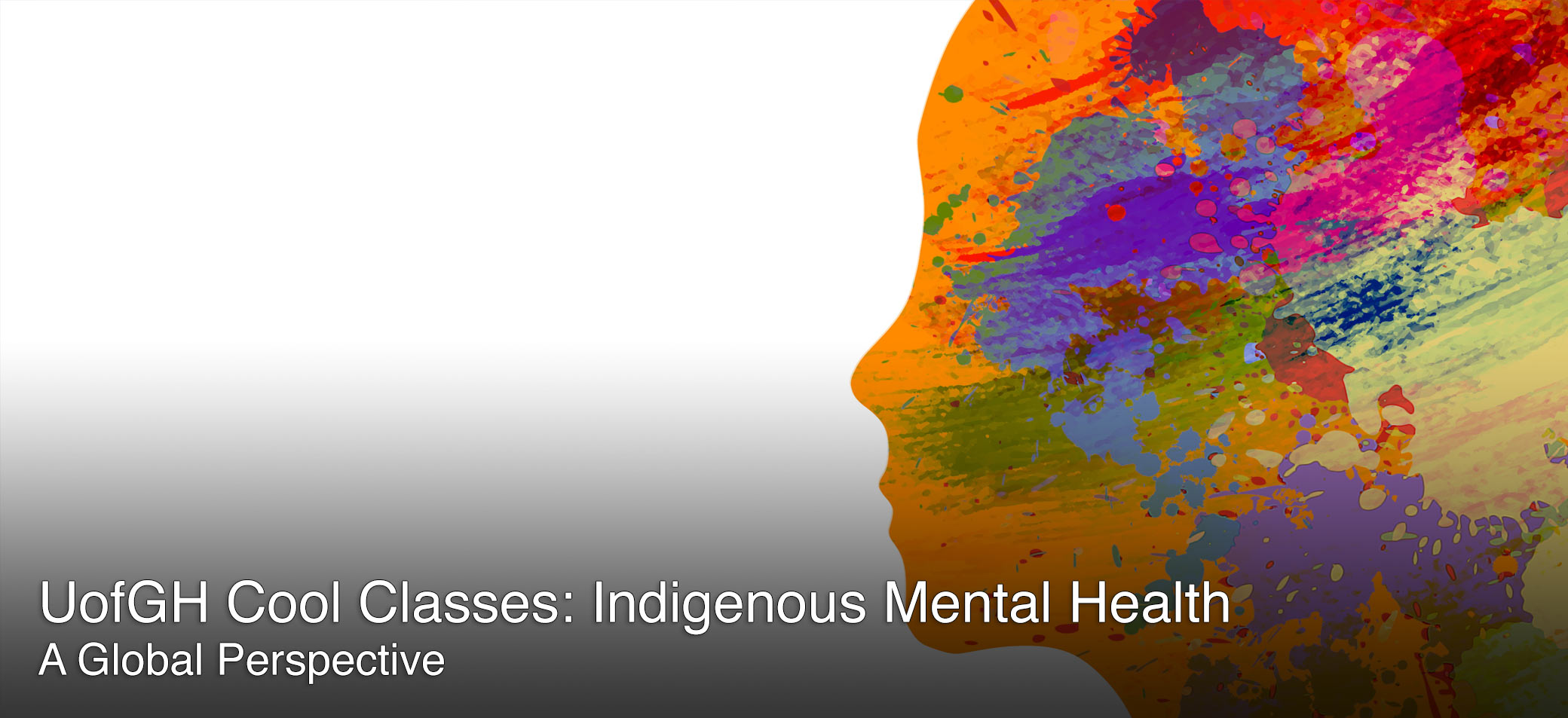- Future Students
- Current Students
- Faculty
- Staff
- Alumni
- Others
UofGH Cool Classes: Indigenous Mental Health - A Global Perspective
Why is the course interesting?
Indigenous communities across the globe, while each diverse and distinct, have experienced similar cultural change, marginalization and colonization. “Indigenous Mental Health: A Global Perspective” examines the challenges faced by Indigenous communities, with an emphasis on the Indigenous historical and social determinants of mental health. Through the course, students will learn about the strength and resilience of Indigenous Peoples around the globe.
“The course creates opportunities for students to compare different concepts of mental health, so they will be better prepared to work, support and establish relationships with Indigenous communities in Canada and abroad,” explained course instructor Dr. Juan Rodriguez Camacho.
The course delves into a topic where information has not always been widely available. In fact, the course textbook was just recently developed by UofGH Psychology Program Head Dr. David Danto and Psychology Professor Dr. Masood Zangeneh in collaboration with scholars from around the world.
Dr. Rodriguez, who is a member of the Indigenous Mhuysqas families from the northeast side of the Andes, brings a wealth of expertise and passion to the course. In his research, Dr. Rodriguez is looking at how to create more opportunities for better collaboration and knowledge sharing. He is also in the process of finalizing a book on the Relatuhedron, a neologism meaning “shaping our relationships.”
“A vital topic of my research is to create a planetary network of Indigenous communities, Indigenous scholars and non-Indigenous scholars working in a supportive and collaborative way,” said Dr. Rodriguez.
What will you learn?
The course takes an inside-outside approach, giving students the opportunity to first reflect on their own background before exploring Indigenous communities around the world.
“Students are going to start a journey of discovering their own roots and how colonization and the same forces that we are going to talk about in the course are affecting them,” Dr. Rodriguez said. “You have to learn first from your personal and family history, your background, your roots, and try to discover your own positionality in the history of Canada as a Treaty Nation.”
The course textbook is divided into 11 chapters. Each week, students dive into a different nation, scholar, history and community. The readings, Dr. Rodriguez said, become a passport to travel the world.
“Each week is a different journey completely. You see patterns because colonization will have the same pattern for all but different and very unique ways and effects depending on Indigenous nations and communities,” Dr. Rodriguez explained.
“After that, you return back home. After traveling to different countries, after visiting their culture, their heritage, and after listening to Elders and Indigenous scholars from India, Nepal, Africa, South America, Australia, Alaska and Canada—then you will be able to have a very global mindset,” Dr. Rodriguez said.
“The global mindset will help you to understand the issues of mental health, Residential Schools' individual, family and community harms and Intergenerational Trauma of Indigenous Nations in Turtle Island, and then will put you in a better position to visualize what is the psychological approach that we need to better support Indigenous Peoples in Canada.”
What will you take away from the course?
As mental health becomes an increasingly important topic in the midst of the pandemic, Dr. Rodriguez hopes this course will be an opportunity for students to take the time to reflect on their own mental health.
“We address the mental health challenges that students are facing in their own lives and try to reflect how those challenges are connected with the course,” said Dr. Rodriguez. “If you are not healed, if you don't feel in balance, then probably you will not be in a good position to help others. It's a process of relationality.”
Ultimately, students will gain a better understanding about other cultures while challenging traditional ideas around mental health and treatment.
“Instead of the stigmas and misconceptions about the indigeneity of Indigenous Peoples mainly caused by strict and rigid mental health definitions created by mainstream traditional psychology, you will have an open mind, moving to a cross-cultural and historical understanding of psychology,” said Dr. Rodriguez.
The course, which is a new core requirement for UofGH Psychology students, is also open to students in other programs who are interested in learning more about mental health across cultures.
“You finish with a perspective of your future role and how you can be a better ally or supportive of Indigenous Peoples if or when in your future profession you are dealing with policy or intervention on mental health concerns, ” said Dr. Rodriguez. “You can learn how to respect, relate and support the recovery of Indigenous communities around the world.”








